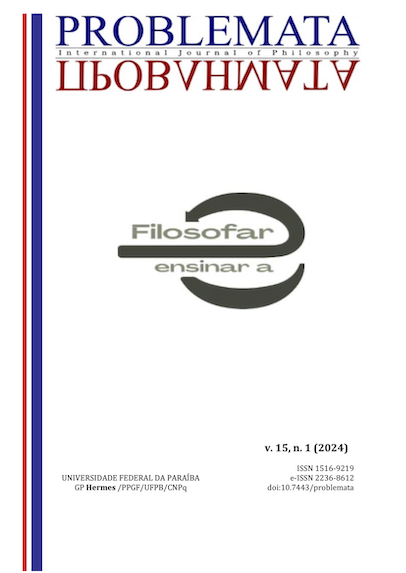PHILOSOPHY TEACHING AND THE PEDAGOGICAL RELATIONSHIP:
WHEN THE OFFICE OF TEACHER IS TO PRODUCE THE PEDAGOGICAL ENCOUNTER
DOI:
https://doi.org/10.7443/problemata.v15i1.70231Keywords:
Artisanship, Pedagogical Relationship, Philosophy Teaching, Teaching AuthorityAbstract
This text is derived from the presentation made at the ANPOF event "VII Encontro Nacional do GT Filosofar e Ensinar a Filosofar: pensar o campo, filosofar o ensino". In this article, we will outline aspects that investigate the interlocutions between the teacher-student relationship and philosophy teaching. The central aim of this paper is to understand what the pedagogical relationship is and how it takes place in high school philosophy classes. For this investigation, we will discuss some basic concepts, namely: the educational context that does not facilitate the conditions for the pedagogical encounter; the proposition that the teacher's authority is based on producing (artisanship) the pedagogical relationship in order to include students in the Work of humanity. In addition, we address the proposition that the artisanship of the pedagogical relationship in the teaching of philosophy derives from conservation and creation with the philosophical subject. Finally, we conclude that the pedagogical relationship in the teaching of philosophy depends on the actions of the teacher-philosopher, orienting himself both as a subject who establishes relationships with himself, with the world and with the Other, and understanding that his teaching activity, in the classroom workshop, produces philosophy.
Downloads
References
ARENDT, Hannah. A condição humana. Tradução de Roberto Raposo. 10. ed. Rio de Janeiro: Forense Universitária, 2007.
ARENDT, Hannah. Entre o passado e o futuro. Tradução de Mauro Barbosa. 6. ed. São Paulo: Perspectiva, 2009.
BRASIL. Ministério da Educação. Base Nacional Comum Curricular. Brasília, 2018.
BRASIL. SENADO FEDERAL. Secretaria legislativa do senado Federal. Medida Provisória n° 746 de 2016. Brasília, 2016.
CERLETTI, Alejandro. O ensino de filosofia como problema filosófico. Tradução de Ingrid Muller Xavier. Belo Horizonte: Autêntica, 2009.
FREIRE, Paulo. Pedagogia da autonomia: saberes necessários à prática educativa. 25. ed. São Paulo: Editora Paz e terra, 2002 (Coleção Leitura).
JOHANSON, Izilda. Filosofia, filósofo, professor de filosofia. Revista da FAAEBA: Educação e Contemporaneidade, p. 55-62, 2013.
KOHAN, Walter Omar. O mestre inventor: relatos de um viajante educador. Belo Horizonte: Autêntica, 2017.
KOHAN, Walter Omar. Infância, estrangeiridade e ignorância: ensaios de filosofia e educação. Belo Horizonte: Autêntica Editora, 2007.
OLIARI, Gilberto. Ofício de professor/a: artesania da relação pedagógica escolar. Tese (Doutorado em Educação) – Programa de Pós-Graduação em Educação, Universidade Federal de Santa Maria. Santa Maria, RS, 2021.
RIO GRANDE DO SUL. Secretaria Estadual de Educação. Referencial Curricular Gaúcho. Disponível em: https://curriculo.educacao.rs.gov.br. Acesso em: 10 fev. 2024.
RODRIGO, Lidia Maria. Filosofia em sala de aula: teoria e prática para o ensino médio. Campinas, SP: Autores Associados, 2009.
SIBILIA, Paula. Redes ou paredes: a escola em tempos de dispersão. Tradução de Vera Ribeiro. Rio de Janeiro: Contraponto, 2012.
Downloads
Published
Issue
Section
License
Copyright (c) 2024 Willian Xavier Lopes

This work is licensed under a Creative Commons Attribution 4.0 International License.
Authors who publish with this journal agree to the following terms:
- Authors retain copyright and grant the journal right of first publication with the work simultaneously licensed under a Creative Commons Attribution License that allows others to share the work with an acknowledgement of the work's authorship and initial publication in this journal.
- Authors are able to enter into separate, additional contractual arrangements for the non-exclusive distribution of the journal's published version of the work (e.g., post it to an institutional repository or publish it in a book), with an acknowledgement of its initial publication in this journal.
-
- Authors are permitted and encouraged to post their work online (e.g., in institutional repositories or on their website) prior to and during the submission process, as it can lead to productive exchanges, as well as earlier and greater citation of published work (See The Effect of Open Access).





